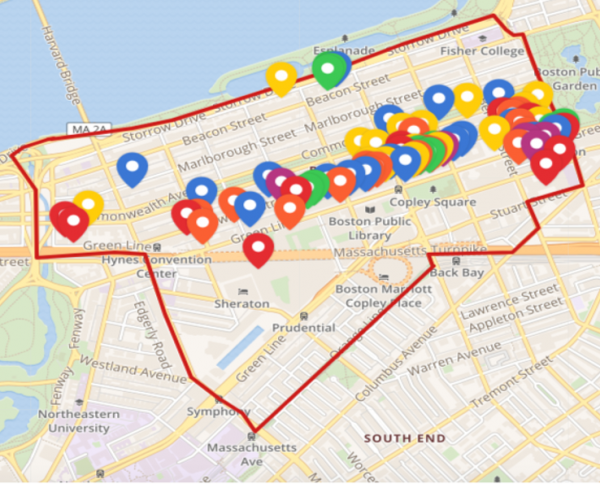The Osher Center offers mentorship for medical students through the Harvard Medical School Scholars in Medicine Office.
Funding may become available for another student to apply for the Osher Scholarly Project. Funding updates will be made via website and newsletter announcements. Students interested in participating in this program should contact the Osher Center at [email protected].
Students will be mentored by faculty at Harvard Medical School, Harvard Business School and Harvard School of Public Health.
Completed 2016-2018 Scholarly Project: Improving Boston’s Health Network
Integrative medicine is concerned not only with the health of individuals, but also with the health of communities. Boston is a vibrant city that benefits from staggering academic, artistic and business resources, but also suffers from the stressful side effects resulting from the sheer intensity and concentration of these very resources.
Stress at a community level impacts the health of individuals, and can reduce quality of life. Although we are making great strides in understanding and mitigating the impact of individual stress, it is also important to translate and apply this knowledge at the level of communities. Furthermore, with the increasing frequency of extreme weather events impacting Boston’s communities, we invite students to explore Boston’s stress landscape in the context of climate change.
A truly integrated approach to addressing stress at a community level in Boston will require a joint effort. Community-based effort will be needed, led by a multidisciplinary cadre of philanthropically-minded individuals, foundations, and/or early stage business investors who are interested in supporting initiatives related to “Improving Boston’s Health” through interrelated areas including health care, education, government, transportation, industry, housing, arts and business.
Initial Goals of this Project:
-
- Conduct surveys, hold focus groups and perform an analysis of the current city-wide “stress” landscape
- What are existing sources of stress?
- How can they be reduced?
- What resources are needed?
- Identify a network of stakeholders connected by existing community organizations, consumer-based networks, and academia
- Enlist the help of multimedia groups to create a concise web-based visualization of the network vision
- Write a case study for “Improving Boston’s Health Network” including a strategy for moving forward.
- Conduct surveys, hold focus groups and perform an analysis of the current city-wide “stress” landscape
Initial Results for 1st stage (2016-2018)
Student: Garret Conyers
Background
Many studies have demonstrated the association between chronic stress and its effect on numerous health morbidities including obesity, suboptimal cardiovascular health & impairments in memory and learning. (1)
Research into stress landscapes has expanded beyond individual sources of stress to the structural and social determinants of neighborhoods. The effects of neighborhood characteristics has been shown to be associated with many health outcomes, but their effect on stress has not been studied. (2)
Boston, Massachusetts is an ideal place to study stress landscapes given the striking geographical health disparities, despite its density of academic health centers, social services and expanded health insurance coverage for low-income residents. (3)
Study Aims: To investigate and compare:
1. perceived neighborhood-level stressors,
2. stress-related negative behaviors, and
3. stress-related health problems in the Boston neighborhoods of Roxbury, Jamaica Plain & Back Bay.
Methods
Survey Development & Administration:
We conducted focus groups of neighborhood residents to unpack the types of stress that were present in each community. In combination with a literature review of social determinants, these insights were used to develop a survey to assess the type and magnitude of neighborhood stressors, stress-related behaviors and health problems that exist in the physical space of the neighborhoods. Residents were surveyed in primary care offices and community health centers in respective neighborhoods.
Surveys consisted of Likert-type scale responses. For each neighborhood stressor and stress-related health problem, the mean response was calculated and compared across neighborhoods.
Resource Distribution Within Boston Neighborhoods

Back Bay

Jamaica Plain

Roxbury
Conclusions
There is marked contrast in stress landscapes, stress-related health problems and negative behaviors between these three Boston neighborhoods despite their geographical proximity.
There is a dissonance between what residents of Roxbury perceived as stressors and what they perceive to be the stress-related health problems and negative behaviors in their neighborhood, which suggests a blind spot in the pathway to disease manifestation and prevention.
Our results suggest that the health of communities could benefit from tailored, neighborhood-level interventions that aim to reduce the unique stress burden that is present in neighborhoods. Further work is needed to elucidate how the unique stress landscape of a neighborhood can influence the health outcomes and behavior of its residents.
Publication
Conyers FG, Langevin HM, Badger GJ, and Mehta DH. Identifying Stress Landscapes in Boston Neighborhoods. Global Advances in Health and Medicine. (2018) doi:10.1177/2164956118803058.
References
-
- McEwen BS. Protective and Damaging Effects of Stress Mediators. New England Journal of Medicine. 1998;338(3):171-179.
- Unger E, Diez-Roux AV, Lloyd-Jones DM, et al. Association of Neighborhood Characteristics With Cardiovascular Health in the Multi-Ethnic Study of Atherosclerosis. Circulation: Cardiovascular Quality and Outcomes. 2014;7(4):524.
- Zimmerman E, Evans, B., Woolfe, S., Haley, A. . Social Capital and Health Outcomes in Boston. Virginia: Virginia Commonwealth University;2012.



